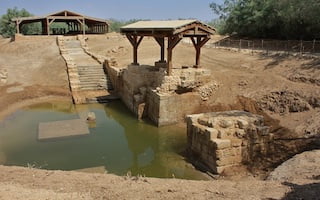 I can see how people can get confused about the baptism bit. I mean, it is only through Jesus that we can be saved so since He was baptized it would only make since that we have to be baptized. But I can understand that Him being baptized just symbolized that we need to be baptized through Him, that water can’t save us, only He can.
I can see how people can get confused about the baptism bit. I mean, it is only through Jesus that we can be saved so since He was baptized it would only make since that we have to be baptized. But I can understand that Him being baptized just symbolized that we need to be baptized through Him, that water can’t save us, only He can.
“Jesus said unto him, I am the way, the truth, and the life: no man cometh unto the Father, but by me” (Jn 14:6).

Even way back then people believed in You and they even feared You, but they also worshiped false gods. Fake gods that were made of wood or stone so I don’t get it. They seemed to be smarter back then. For example, we couldn’t build the pyramids without tools, but they did. I want to look more into that tomorrow.
1 But now thus saith the LORD that created thee, O Jacob, and he that formed thee, O Israel, Fear not: for I have redeemed thee, I have called thee by thy name; thou art mine.
“Created…formed” – God made the nation Israel as surely as He made the first man (Gen 1:27).

A substance found by archaeologists working in an Ancient Egyptian tomb has proved to be one of the oldest cheeses ever discovered.
Several years ago, the team discovered broken jars in the tomb of Ptahmes, a high-ranking Egyptian official.
The archaeologists found a “solidified whitish mass” in one of the jars which they suspected was food but were unsure which kind.
“The material analysed is probably the most ancient archaeological solid residue of cheese ever found to date,” said Dr Enrico Greco.
“We know it was made mostly from sheep’s and goat’s milk, but for me it’s really hard to imagine a specific flavor.”
The researchers say they also found traces of a bacterium that can cause an infectious disease known as brucellosis, which comes from consuming unpasteurised dairy products. Symptoms include fever, sweating and muscle aches, and the disease still exists today. If confirmed, it would be the oldest evidence of such a case.
“Called thee by thy name” – God chose Israel to serve Him in a special way.
2 When thou passest through the waters, I will be with thee; and through the rivers, they shall not overflow thee: when thou walkest through the fire, thou shalt not be burned; neither shall the flame kindle upon thee.
“Waters…rivers” – Pro an allusion to crossing the Red sea (Ex 14:21-22).
“Walkest through the fire” – fulfilled literally in the experience of Shadrach, Meshach and Abednego (Dan 3:25-27).
3 For I am the LORD thy God, the Holy One of Israel, thy Savior: I gave Egypt for thy ransom, Ethiopia and Seba for thee.
“Savior” – who delivers from the oppression of Egypt or Babylon and from the spiritual oppression of sin. The name “Isaiah” means “The LORD saves.”
“Ransom” – the Persians conquered Egypt, Cush and Seba, and perhaps this was a reward or ransom for Persia’s kindness of Israel. The Lord loves Israel so much that H allows other nations to experience oppression in its place.
Seba” – a land near Cush or Sheba. It was probably either in south Arabia.
4 Since thou wast precious in my sight, thou hast been honorable, and I have loved thee: therefore will I give men for thee, and people for thy life.
5 Fear not: for I am with thee: I will bring thy seed from the east, and gather thee from the west;
6 I will say to the north, Give up; and to the south, Keep not back: bring my sons from far, and my daughters from the ends of the earth;
7 Even every one that is called by my name: for I have created him for my glory, I have formed him; yea, I have made him.
8 Bring forth the blind people that have eyes, and the deaf that have ears.
“Blind…deaf” – probably referring to Israel.
9 Let all the nations be gathered together, and let the people be assembled: who among them can declare this, and shew us former things? Let them bring forth their witnesses, that they may be justified: or let them hear, and say, It is truth.
43:9-13 – a court scene.
“Witnesses” – to verify the accuracy or earlier predictions by idols or their worshipers.
10 Ye are my witnesses, saith the LORD, and my servant whom I have chosen: that ye may know and believe me, and understand that I am he: before me there was no God formed, neither shall there be after me.
“Ye are my witnesses” – God’s work in behalf of Israel is proof of His saving power.
11 I, even I, am the LORD; and beside me there is no savior.
12 I have declared, and have saved, and I have shewed, when there was no strange god among you: therefore ye are my witnesses, saith the LORD, that I am God.
“Strange god” – Israel repeatedly worshiped other gods.

Archaeologists in Egypt say they’ve discovered not one, but two beautifully decorated ancient tombs near the historic city of Luxor.
The tombs, found in the Sheikh Abd el-Qurna (‘Tombs of the Nobles’) archaeological site, are believed to date back to the 18th Dynasty of the Egyptian New Kingdom (1543-1292 B.C.), according to a written statement from The American Research Center in Egypt.
Both were covered in hieroglyphics and colorful murals on plaster depicting the tomb’s owners, who are believed to be father and son.
Both tombs contain debris and evidence of ancient looting and vandalism, according to the statement. The tombs share a courtyard with the Tomb of Djehuty, which was commissioned by a royal cupbearer for the pharaohs Hatshepsut and Tuthmosis III, Discovery reported.
A god’s doorkeeper and his wife. The first tomb, belongs to an Amenhotep (doorkeeper to the Egyptian god Amun) surnamed Rabiu, and his wife, Satamen.
13 Yea, before the day was I am he; and there is none that can deliver out of my hand: I will work, and who shall let it?
“None that can deliver…hand” – quoted verbatim from Deut 32:39.
14 Thus saith the LORD, your redeemer, the Holy One of Israel; For your sake I have sent to Babylon, and have brought down all their nobles, and the Chaldeans, whose cry is in the ships.
“Brought down all their nobles” – Lit. “brought down all of them as fugitives.” Babylon will go from being the oppressor to the oppressed.
“Whose cry is in the ships” – the Babylonian used the Persian Gulf, as well as the Tigris and Euphrates rivers, for trading purposes. But their splendid ships would one day become their means of flight.
15 I am the LORD, your Holy One, the creator of Israel, your King.
“King” – God was called “king in Jeshrun” (Israel) in Deut 33:5 (contrast 1 Sam 8:7).
16 Thus saith the LORD, which maketh a way in the sea, and a path in the mighty waters;
43:16-17 – a reference to crossing the Red sea. Pharaoh’s chariots and for horsemen were destroyed as Israel’s God fought against them (see 51:10; Ex 14:28, 15:4).
17 Which bringeth forth the chariot and horse, the army and the power; they shall lie down together, they shall not rise: they are extinct, they are quenched as tow.
“Quenched as tow” – extinguished like a wick in an oil lamp.
18 Remember ye not the former things, neither consider the things of old.
19 Behold, I will do a new thing; now it shall spring forth; shall ye not know it? I will even make a way in the wilderness, and rivers in the desert
“Way in the wilderness” – a road or highway.
20 The beast of the field shall honor me, the dragons and the owls: because I give waters in the wilderness, and rivers in the desert, to give drink to my people, my chosen.
“Dragons…owls” – probably “jackals” and “ostriches,” creatures of the desert.
21 This people have I formed for myself; they shall shew forth my praise.
22 But thou hast not called upon me, O Jacob; but thou hast been weary of me, O Israel.
43:22-24 – Not called…been weary” – apparently their prayers were halfhearted.
23 Thou hast not brought me the small cattle of thy burnt offerings; neither hast thou honored me with thy sacrifices. I have not caused thee to serve with an offering, nor wearied thee with incense.

Amenhotep’s son and his wife, belongs to Sa-mut, the son of Amenhotep and Satamen, and his wife, Ta-Khaeet.
“Have not caused thee to serve…nor wearied” – God didn’t make excessive demands on His people.
24 Thou hast bought me no sweet cane with money, neither hast thou filled me with the fat of thy sacrifices: but thou hast made me to serve with thy sins, thou hast wearied me with thine iniquities.
“Cane” – linked with incense.
25 I, even I, am he that blotteth out thy transgressions for mine own sake, and will not remember thy sins.
“Blotteth out thy transgressions” – in spite of the punishment Israel must suffer, God is eager to forgive His people.
26 Put me in remembrance: let us plead together: declare thou, that thou mayest be justified.
“Let us plead together” – the Lord takes Israel to court, as He did the nations in 41:21-22.
27 Thy first father hath sinned, and thy teachers have transgressed against me.
“Thy teachers” – probably the priests and prophets.
28 Therefore I have profaned the princes of the sanctuary, and have given Jacob to the curse, and Israel to reproaches.
“Have given…to the curse” – any town of Israel that harbored idolatry was to receive this fate (Deut 13:12-15). Jerusalem suffered destruction at the hands of the Babylonian’s because of idolatry.
Baptism
Baptism has been misused and misunderstood for centuries. Some people think you have to be baptized to be saved and they probably assume this due to the following scripture:

The James Ossuary is a 1st-century limestone box that was used for containing the bones of the dead. An Aramaic inscription in the Hebrew alphabet meaning “James, son of Joseph, brother of Jesus” is cut into one side of the box. The inscription is considered significant because, if genuine, it might provide archaeological evidence for Jesus of Nazareth.
However, while the ossuary itself is accepted as authentic to the time period, the inscription itself could be a modern forgery.
The existence of the ossuary was announced at an October 21, 2002 Washington press conference co-hosted by the Discovery Channel and the Biblical Archaeology Society. The owner of the ossuary is Oded Golan, an Israeli engineer and antiquities collector.
The initial translation of the inscription was done by André Alexandre Lemaire, a Semitic epigrapher, whose article claiming that the ossuary and its inscription were authentic was published in the November/December 2002 Biblical Archaeology Review.
In 2003, The Israel Antiquities Authority (IAA) determined that the inscriptions were forged at a much later date. In December 2004, Oded Golan was charged with 44 counts of forgery, fraud and deception, including forgery of the Ossuary inscription.
The trial lasted seven years before Judge Aharon Farkash came to a verdict. On March 14, 2012, Golan was acquitted of the forgery charges but convicted of illegal trading in antiquities. The judge said this acquittal “does not mean that the inscription on the ossuary is authentic or that it was written 2,000 years ago.” The ossuary was returned to Golan, who put it on public display
“Then Peter said unto them, Repent, and be baptized every one of you in the name of Jesus Christ for the remission of sins, and ye shall receive the gift of the Holy Ghost” (Act 2:38).
And to add fire to that scripture, they use misunderstand Jesus when He says:
“So after he had washed their feet, and had taken his garments, and was set down again, he said unto them, Know ye what I have done to you?
Ye call me me Master and Lord: and ye say well; for so I am.
If I then, your Lord and Master, have washed your feet, ye also ought to wash one’s another’s feet.
For I have given you an example, that ye should do as I have done to you” (Jn 13: 12-15).
Jesus does not mean for us to go around washing people’s feet, He wants us to help others in all ways, including the most menial serves. Paul explains the above scripture:
“Be ye therefore followers of God, as dear children;
And walk in love, as Christ also hath loved us, and hath given himself for us an offering and a sacrifice to God for a sweetsmelling savor” (Eph 5:1-2).
Jesus never told us to wash the feet of others, He did say:
“Jesus said unto him, Thou shalt love the Lord thy God with all they heart, and with all they soul, and with all thy mind.
This is the first and great commandment.
And the second is like unto it, Thou shalt love they neighbor as thyself.
On these two commandments hang all the law and the prophets” (Matt 22:37:40).
There is no commandment, law or words from the prophets that talk about washing feet or being baptized in order to be saved. Jesus didn’t even mention baptism on His sermon on the mount or the beatitudes (Matt 5:1-12).
Jesus was baptized by John the Baptist (Matt 3:13-17) so since Jesus gave us an example of how to be helpful and kind to people by washing feet, so some think He wants us to be baptized too.
So since Jesus was baptized with water should we do also? Yes, I think we should, but it is necessary to be saved. Here is a good example of why we should be baptized. When you get married you put on a wedding ring that shows you are married.
That ring is not what made you married, it just symbolizes that marriage. The same with baptism, it doesn’t save you, it symbolizes your love for Jesus.
No some people think that all you have to do is be baptized to be saved, you don’t even have to believe, they get this foolish idea from:
“The like figure whereunto even baptism doth also now save us (not the putting away of the filth of the flesh toward God,) by the resurrection of Jesus Christ” (1 Pet 3:21).

Scripture names the place of the baptism of Jesus by John (“the Baptist,” Mt 3:13) as “Bethany beyond the Jordan” (Jn 1:28).
Identifying this particular locale as Bethany “beyond the Jordan” was done to prevent confusing it with another Bethany also mentioned in the Bible, one nearer to Jerusalem where Lazarus and his sisters lived (Jn 11:1).
Uncertainty has surrounded the exact location of “Bethany beyond the Jordan.” Recent archaeological investigations on the east side of the Jordan River have revealed that Wadi el-Kharrar could be the site. Wadi el-Kharrar is located near the Jordan River about six miles (10 km) east of modern Jericho.
Archaeologists have ascertained this area was revered as the place of Jesus’ baptism from shortly after His crucifixion and resurrection. Christian pilgrims mention the site in their writings until the time of Joannes Phocas in AD 1185.
It is also clearly identified on the famous Madaba Map, a sixth-century mosaic found in St. George Greek Orthodox Church, once a Byzantine Church, in Madaba, Jordan.
In Wadi el-Kharrar, numerous springs, one of which is even named “John the Baptist,” join together and flow into the Jordan River. Remains of Christian churches from the Roman and Byzantine periods have been identified. Greek Orthodox monks who occupied portions of the area between the 12th and 18th centuries revered it as the location of Jesus’ baptism.
People interpret that to mean that since Jesus was resurrected we can be filthy, evil, horrible people as long as we get baptized and that’s basically what the Catholics do. What a bizarre thought. Paul made it clear how wrong the misinterpretation of the above scripture is:
What shall we do then? Shall we continue in sin, that grace may abound?
God forbid. How shall we, that are dead to sin, live any longer therein?
Know ye not that so many of us as were baptized into Jesus Christ were baptized into his death?
Therefore we are buried with him by baptism into death: that like as Christ was raised up from the dead by the glory of the Father, even so we also should walk in newness of life (Rom 6:1-4).
Since Jesus was crucified should we be too?
True baptism is not of water, but of Jesus Christ as John the Baptist made perfectly clear:
I indeed baptize you with water unto repentance: but he that cometh after me is mightier than I, whose shoes I am not worthy to bear: he shall baptize you with the Holy Ghost, and with fire (Matt 3:11).
Being baptized with water symbolizes our love for Jesus, just like Jesus washing His disciples feet symbolized humbling yourself before others.
Visits: 0
